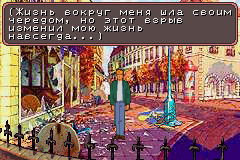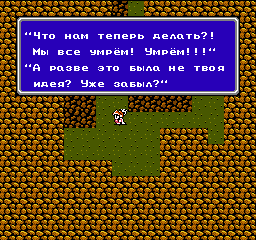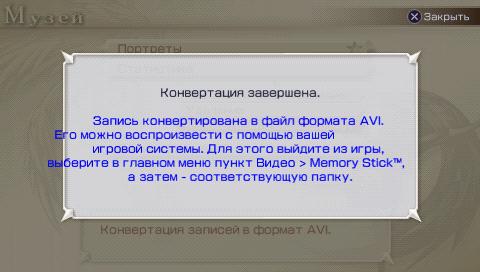Localization of games - amateurs versus professionals

As a person who has long been involved in a wide variety of unofficial sites as an amateur, I want to share my thoughts about the situation on this front.
Recently, the gaming industry has become an integral part of our lives, and with the growing share of the interactive entertainment market in our country, the importance of the phenomenon of localization is growing. If, for example, things are more or less acceptable with films in this regard, then this is a real trouble with games.
But there are people who are not indifferent to the situation. About them and will be discussed further.
')
Sense of beauty
 Unlike the film, which not everyone can see in the original, in the game you can enjoy the process itself, not really delving into the details of the plot. This is what publishers use, saving on new frames and depriving those unfortunate people who are not indifferent to the plot component, from being able to enjoy.
Unlike the film, which not everyone can see in the original, in the game you can enjoy the process itself, not really delving into the details of the plot. This is what publishers use, saving on new frames and depriving those unfortunate people who are not indifferent to the plot component, from being able to enjoy.We see on the shelves Russian versions of low-quality trash, which are bought by packs indifferent to the “beautiful” girls and boys, but not all world-famous masterpieces are rewarded with translation. That is, a masterpiece is not enough just to be a masterpiece, it should be popular, and its localization should not deliver too much headache.
Many do not care about this problem, in part because their tastes coincide with the interests of publishers. And on the PC, where the bulk of the consumer audience has accumulated, the situation is much better than on consoles. But we will not concretize and take into account the game in general, regardless of the platform.
Army of enthusiasts
For a long time there have been people, groups, and there — entire communities that devote their free time to amateur localization. Of course, nowadays the threshold for entry into this craft has dropped so much that this multitude of enthusiasts is almost entirely composed of drop-out students. But even in this haystack you can find your needles - some of these figures can not fail to command respect, sometimes winning in all respects even from official localizers.
Many of us literally grew up on unofficial localizations - pirated or amateur. For example, for some time I have never seen a single official translation. And, recalling those times, I can say that separately taken creations could not be called as masterpieces - megabytes of the translated text could be read like a book, were they bound. Is it possible to say the same about official translations? I think only in exceptional cases.
So what is so different about the creation of an enthusiast from the product of production? The voice of reason tells me that an amateur in all respects is inferior to a professional because he is ... an amateur. In general, in most cases this is the case, but ... if we at once discard all the stupid self-taught and leave only promising beginners, then an interesting fact opens up: indeed, many of the fan localizations outperform commercial ones in almost all criteria.

The reasons are mostly banal and obvious - if you do something with love, then the result will be appropriate. But let's leave subjective assumptions for a while and look at things impartially.
So who is cooler?
Further, in the text, I slightly combined the concepts of "amateur", "fan" and "amateur" in order to avoid excessive tautology. Consider the advantages and disadvantages of a more or less competent fan in front of an indifferent to the game professional.
So, the advantages of an amateur translator:
- Awareness. The fan thoroughly knows the subject area of the project, I mean, I am familiar with the game as with my five fingers. He is a walking encyclopedia, and other individuals will tell you the etymology of the name of any monster, backing it up with a couple dozen references to various epics and artistic works, even if you wake them up deep in the night. With this knowledge, you can partially recreate the logic of thinking of the creators of the game, applying it to the translation process.
- Demanding on the result. Unlike official localizers, it is important for an amateur not only the availability of the result, but also the result itself. Most fans do the translation more for themselves than for others. Where the interpreter for hire is clearly faked, the amateur will do everything according to his conscience.
- Immunity to restrictions. A fan often does not care about technical difficulties and other crap , which justifies localizers when translation is not as good as it could be. It will be necessary - he will interfere in the code of the game as long as everything looks like a human being. In certain communities, this is even commonplace, as is fixing the bugs of the original version.
- Attentiveness Whatever the quality control in production, a neat amateur explores the translation for errors better than any of the editors. He can polish his work to shine, paying close attention to each pixel of the displayed text.

- Initiative . Lovers, as a rule, creative people - the creation in their blood. Therefore, they sometimes can not resist the temptation to improve something in the game. Yes, it is to improve, for example, by adding patches to the translation, correcting some of the flaws of the original.
- Assortment - if publishers are chasing profits, localizing the most profitable games, then fans justify their rank, and translate only those games that they like themselves. Very often, the list includes toys that the localizers have no hands on at all.
- Independence. Localizers are totally dependent on publishers and developers. The amateur is his own master, which gives him the opportunity to make all decisions directly and spit on marketing there.
- Unselfishness. The amateur doesn’t care that the game hasn’t brought profit to the publisher for a long time. For him, it will always be relevant. Well, or until he loves her.
- Lack of censorship. Sometimes publishers are too abused by censorship, fearing to cause shock to representatives of another culture or chasing age ratings. This is particularly affected by games with religious or sexual overtones. For example, a resurrection in a church can easily become a cure in a hospital. Of course, a fan of this will not allow.
But let's not forget about the disadvantages:
- Subjectivity. Lovers are often too subjective. An example is almost all fansabbers - they consider it a blessing to adapt Japanese names and names to Russian consumers. At the same time, playing the English version of the Japanese game, they rarely have something against the same adaptation, but for the American audience. There are cases when due to generated holivars like “Polivanov vs. Hepburn " translations were abandoned. It would seem, what could be more harmless than a sushi or sushi question? But, alas, personal affection is a serious matter.
- The influence of habit. For lovers, there are too many "sacred cows." This could be attributed to the first point, but the scale of the problem forced me to recall this separately. Any bored trifle, be it a wrong pronunciation or a habitual spelling, can be a stumbling block or just mindlessly get into the translation. I got used to a hard-nosed fan of Big Bad Wolf , and no one would convince him of the need to rename the character Wolf.
 Low "professional" level. Yes, most enthusiasts sit and translate with a dictionary, because those who can do it freely cannot always do it for free. Thus, any idiom can easily turn into a fairy tale about wild geese .
Low "professional" level. Yes, most enthusiasts sit and translate with a dictionary, because those who can do it freely cannot always do it for free. Thus, any idiom can easily turn into a fairy tale about wild geese .- Low motivation. Not everyone has enough of it, it is peculiar to quickly run out of enthusiasm, especially when it comes to large amounts of work. Perhaps, sometimes the only source of motivation may be the anticipation of the moment when the translation will be completed.
- Limited resources - human, temporary, financial - do not give full time to such hobbies. The more time passes, the more you have to throw a hobby in favor of more important things.
- Timing. Many amateur projects last for years, in some cases - almost decades. During this time, the translation may lose relevance, but, nevertheless, among connoisseurs, it will not lose its significance.
- Loss of meaning There is such a phenomenon - a spoiled phone. This is when the translation is being finalized by people who do not compare with the original. Thus, texts can be polished more than once, but each such “improvement” can be fraught with a loss of original meaning. In addition, the practice of “re-translation” is not uncommon, when, say, as the source texts, instead of the Japanese original, its translation into English is taken.
- Methodology and terminology. This is one of the biggest problems that bothers me. Amateurs cannot be expected to have well-coordinated work or professional slang, so often the whole process looks like a complete chaos: technical aspects are solved by rough crutches, the translated text is a mash-up of the actual text and all sorts of technical rubbish, with the possibility of decomposition into two different entities, but project participants communicate with each other in an incomprehensible local slang, which has taken the place of adequate terminology.
- The legal side of the issue. Although in this area precedents in the legal arena are very rare, there is still no clear framework for what is allowed and what is not. In any case, it is reliably known that some publishers are loyal to such manifestations of fanaticism. If the right holders and claims have arisen, so far they have limited themselves to a letter with a polite request to refrain from further work. For obvious reasons, the translators did not have any objections.
A funny case will come to the place: once, the well-known publisher of Square Enix, reissuing Final Fantasy VI with a new translation into English (the original language of the game is Japanese), allowed himself to release a joke about an unofficial translation - in the game of Kefka cult fanatics antagonist of the game, strongly demanded to write his name as "Cefca". That is how it was written in the fan translation.
Third side?
Surely many thought that I forgot about another type of localization - pirated transfers. But, in this situation, I would refer them to amateur ones, although not every pirate in relation to the word “fan”.

In any case, they are closer to this path than to any other official. Of course, looking at the level of organization of some well-known firms, one can challenge their non-professional status, but this didn’t come right away - everyone started with something. In addition, there were often cases when amateurs made translations on the order of pirate offices. As a rule, such offices did not have a staff responsible for localization.
Another argument in favor of the amateurish nature of pirates can be profit for translation activities - it is ridiculous. Undoubtedly, there are more successful, "wealthy" pirates, but these are isolated cases.
findings
Both the amateur and the official approach have their weak points. But, despite the huge number of minuses of the amateur translation, I find its advantages much more significant. This gives me the right to believe that in many ways amateur translations exceed the official localization (not always, but as a fact). After all, if the official localizers and publishers paid attention to the nuances over which the amateurs are so focused, then such a comparison would not have to be made.
But if you think about it, how great it would be to improve the skills of amateurs, depriving them of the above disadvantages, and putting them into production! But, no matter how you argue, this will remain just another utopian dream.
Please note that all this is only my opinion on the current situation in our country, which does not pretend to be a common truth or authoritative opinion.
Links
- The largest database of unofficial localizations .
- romhacking.net - a large international archive of translations, tools and other things.
- romhacking.net.ru - an attempt to make a domestic analogue of romhacking.net.
- Group "Masterpiece" - one of the oldest groups involved in amateur translations.
- The “ExclusivE” group is a rather well-known group of translators thanks to its large releases.
- Zone of Games is one of the largest communities on this topic.
PS If someone is interested in what the process of amateur translation looks like, including all technical aspects, and how it differs from work experience, then I’m ready to talk in detail about this in the future.
Source: https://habr.com/ru/post/140513/
All Articles